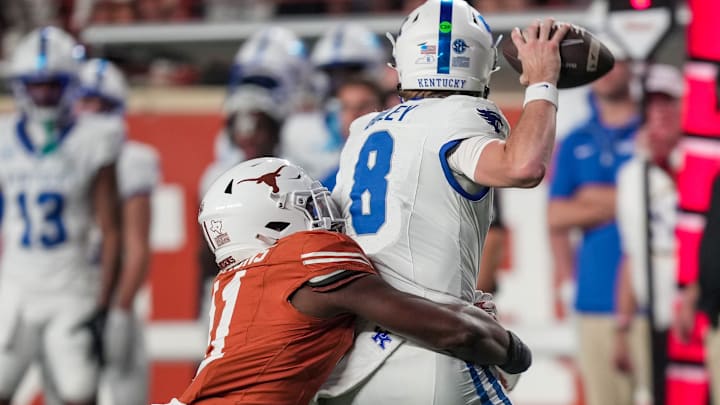There's a consistent excuse rolling around Big Blue Nation: while it's not the majority, there's a strong minority that believes better offensive line play is the difference between this bad Kentucky football team and a good one. It's actually an excuse that's hard to debunk completely because there is an element of truth to it. The offensive line play has been bad, and it's caused some major frustrations in the offensive play, especially in the SEC. However, that's like blaming your golf clubs when you stink at golf. There may be some truth to it, but there are bigger things at play.
First, let's get into the stats that cause frustration. Kentucky has allowed 279 total sack yards and an average of 3 sacks a game, good for 115th in the nation. They've also allowed an average of six tackles for loss a game, accounting for 350 total lost yardage. That brings them in at 93rd in the nation. That's not good, and both of those are about 90% on the offensive line.
However, the bigger factor at play than the offensive line is the development of an offensive line. It's not like these linemen are taken off the street and asked to block. These were highly rated recruits that were never developed or taught to play at a high level. And the ones that transferred in this year, like Gerald Mincey, weren't coached in a way that allowed them to succeed. If they can succeed last year but stink this year, that's typically a coaching problem.
Offensive Line Grades As Recruits/Transfers
At the beginning of the year this was the starting line unit and how they graded coming into Kentucky.
LT: Marques Cox - 3 star (voted to preseason Third-Team All SEC)
LG: Jager Burton - 4 star
C: Eli Cox - 3 star
RG: Jalen Farmer - 3 star
RT: Gerald Mincey - 3 star
The biggest problem isn't talent; the problem remains coaching and development. Sure, you could argue that they aren't good players, but the roster is full of 3-star and 4-star players; they can't all be busts. The odds are just not good enough for that. This is why I don't think just paying more in NIL or even recruiting better players will help. This is a bigger problem than just poor offensive line play.
South Carolina has a worse statistical offensive line than Kentucky and yet they are 8-3.
However, for the sake of argument, let's assume that it is just a poor offensive line. There are still things that can be done about it that Kentucky rarely does. Play-calling and execution are huge ways of accommodating a bad line. Do you know who also has a bad offensive line in the statistics? South Carolina. They are ranked below Kentucky in both yards for loss allowed and sacks allowed, truly amongst the bottom in college football. Yet, they are 8-3 on the year. Oh, what we would do to be 8-3 on the year.
Play-calling
The first thing you can do is adjust the play-calling. As I was watching Sunday night football last night in the NFL, this line was said by Al Michaels, "McVay knows that his line can't block right now, and so he's adjusted his play-calling to accommodate for it, and it's working." Weird... You can change how you call the game if your line isn't blocking? Someone call Stoops!
Execution
The other thing that has to happen or should have happened (since the season is almost over) is how you execute. A quarterback can either help or hurt a struggling offensive line. There was a clear example of this in the game against Texas.
I had a DiCaprio moment...I hate doing this but I just have to do it. I apologize in advance to anyone harmed by this...ASMR style because words are not needed... pic.twitter.com/m9xGNtI8nl
— Van Hiles (@vstyles17) November 25, 2024
If you can't watch these two plays, the first is Brock Vandagriff playing in the first half, in which he takes the snap, barely reads his receivers, runs around the line, and gets tackled for a two-yard game. It was a baffling moment in the game. The second clip is Cutter Boley in the same situation, and yet when he moves to his left to give his offensive line time, he is able to stay behind the line of scrimmage and hit one of his receivers for a good chunk gain. That's a great example of executing when the offensive line is struggling.
At the end of all this, I think the biggest problem remains: coaching and development (which is also coaching). Kentucky's offensive line woes will continue with these same coaches, no matter who they bring in.
